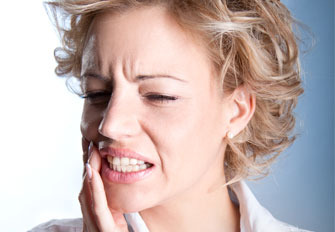04 Oct How Does A Root Canal Become Infected?
 A root canal infection is a common problem and easy to treat. There are many factors that can lead to this condition. Any dentist will tell you that improper oral hygiene is the major culprit. When we do not brush at least three times a day, plaque build-up begins. This soft matter soon hardens if it is not removed and becomes a good breeding ground for harmful bacteria. The bacteria makes its way past the enamel, dentin or cementum and into the pulp canal. The patient then begins to feel swelling in the gingival area, accompanied by a constant and throbbing sort of pain.
A root canal infection is a common problem and easy to treat. There are many factors that can lead to this condition. Any dentist will tell you that improper oral hygiene is the major culprit. When we do not brush at least three times a day, plaque build-up begins. This soft matter soon hardens if it is not removed and becomes a good breeding ground for harmful bacteria. The bacteria makes its way past the enamel, dentin or cementum and into the pulp canal. The patient then begins to feel swelling in the gingival area, accompanied by a constant and throbbing sort of pain.
Treating a root canal in San Antonio is not uncommon. Treatment should be performed by a licensed dentist who has extensive knowledge about endodontic therapy and the procedures involved. The goal of this treatment is to kill the bacteria in the pulp chamber in an attempt to preserve the natural tooth. This is a conservative dental procedure that requires consecutive follow-up appointments.
Other possible causes are dislodged fillings, which may lead to secondary carious lesions, teeth with minute fractures that cannot be seen by the naked eye, and exposed dentinal tubules. If the mentioned scenarios are ignored, the patient unknowingly puts the tooth at risk. By doing so, he or she may not realize that all the internal structures found in the oral cavity are in danger.
A root canal infection can become severe and spread to other areas found in the face or even the skull. Since our mouth is the dirtiest place in the whole body, exposure to harmful bacteria is imminent. This is one important reason why dental problems should be treated as soon as possible. Due to the mouth being in close proximity to structures like the brain, sinuses, nerves and arteries, diseases like septicemia and meningitis are possible outcomes if the infection is not addressed.
Protect your body from infection and other diseases by maintaining proper oral hygiene. Teeth are just as important as your other vital organs. To avoid medical complications, follow all after-care instructions given to you by your dentist. If you feel extra sensitivity to hot or cold food beverages centered on a certain tooth, call 210-616-0858 to consult our dentistry team right away.


